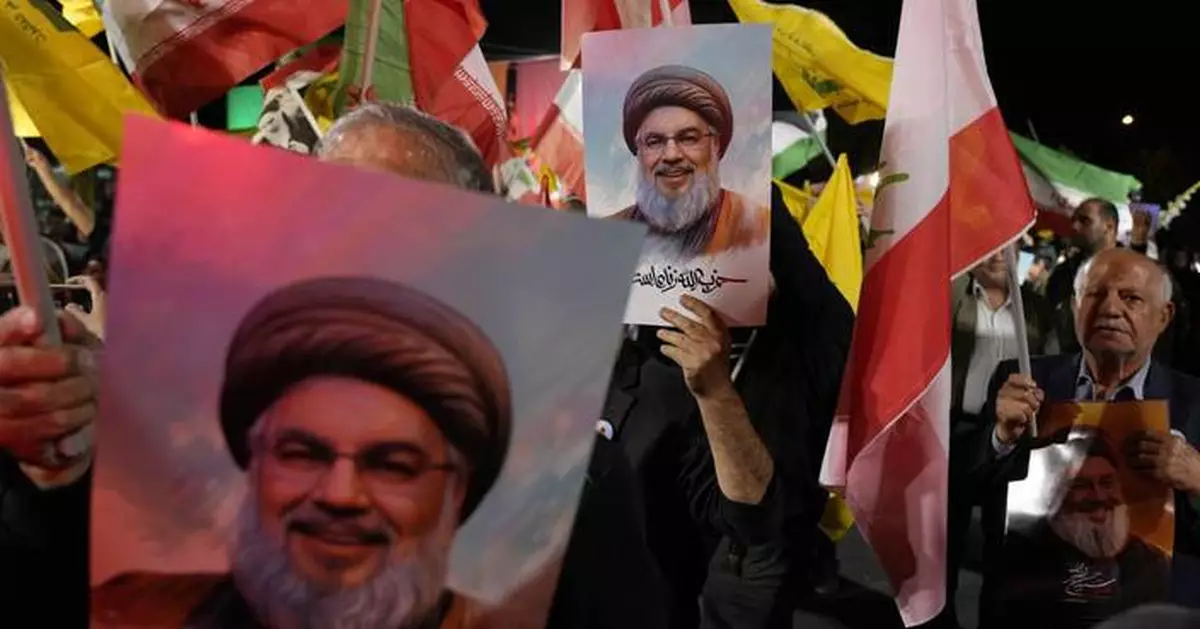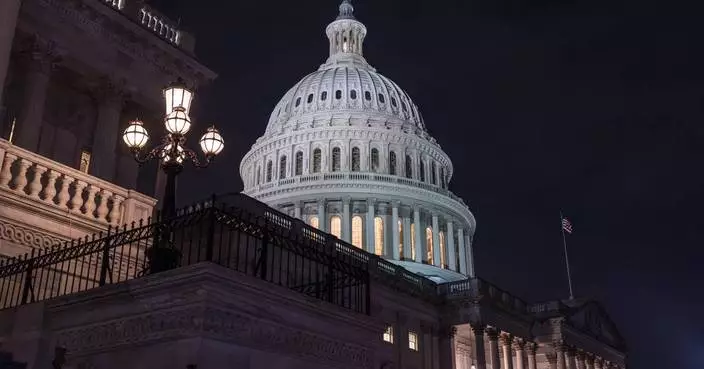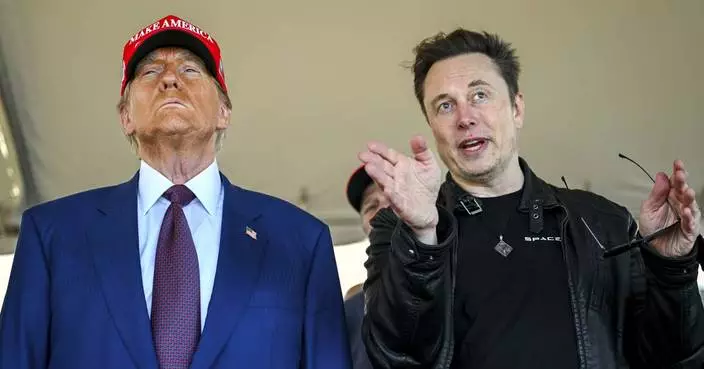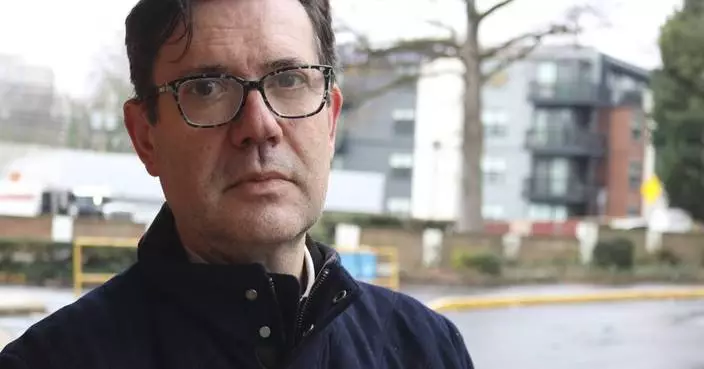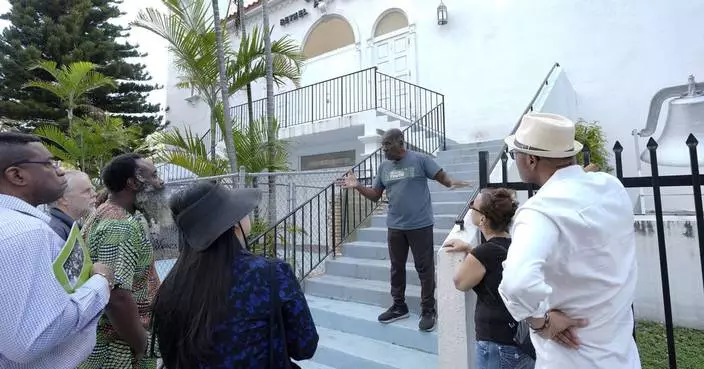WASHINGTON (AP) — Israeli military strikes are targeting Iran's armed allies across a nearly 2,000-mile stretch of the Middle East and threatening Iran itself. The efforts raise the possibility of an end to two decades of Iranian ascendancy in the region, to which the 2003 U.S. invasion of Iraq inadvertently gave rise.
In Washington, Tel Aviv and Jerusalem, and Arab capitals, opponents and supporters of Israel's offensive are offering clashing ideas about what the U.S. should do next, as its ally racks up tactical successes against Hezbollah in Lebanon and the Houthis in Yemen and presses its yearlong campaign to crush Hamas in Gaza.
Israel should get all the support it needs from the United States until Iran's government “follows other dictatorships of the past into the dustbin of history,” said Richard Goldberg, a senior adviser at Washington's conservative-leaning Foundation for the Defense of Democracies — calls echoed by some Israeli political figures.
Going further, Yoel Guzansky, a former senior staffer at Israel’s National Security Council, called for the Biden administration to join Israel in direct attacks in Iran. That would send "the right message to the Iranians — ‘Don’t mess with us,’'' Guzansky said.
Critics, however, highlight lessons from the U.S. military campaign in Iraq and toppling of Saddam Hussein, when President George W. Bush ignored Arab warnings that the Iraqi dictator was the region's indispensable counterbalance to Iranian influence. They caution against racking up military victories without adequately considering the risks, end goals or plans for what comes next, and warn of unintended consequences.
Ultimately, Israel “will be in a situation where it can only protect itself by perpetual war,” said Vali Nasr, who was an adviser to the Obama administration. Now a professor at Johns Hopkins School of Advanced International Studies, or SAIS, he has been one of the leading documenters of the rise of Iranian regional influence since the U.S. invasion of Iraq.
With Israeli Prime Minister Benjamin Netanyahu giving limited weight to Biden administration calls for restraint, the United States and its partners in the Middle East are “at the mercy of how far Bibi Netanyahu will push it,” Nasr said, referring to the Israeli leader by his nickname.
“It's as if we hadn't learned the lessons, or the folly, of that experiment ... in Iraq in 2003 about reshaping the Middle East order,” said Randa Slim, a fellow at SAIS and researcher at the Washington-based Middle East Institute.
Advocates of Israel’s campaign hope for the weakening of Iran and its armed proxies that attack the U.S., Israel and their partners, oppress civil society and increasingly are teaming up with Russia and other Western adversaries.
Opponents warn that military action without resolving the grievances of Palestinians and others risks endless and destabilizing cycles of war, insurgency and extremist violence, and Middle East governments growing more repressive to try to control the situation.
And there’s the threat that Iran develops nuclear weapons to try to ensure its survival. Before the Israeli strikes on Hezbollah, Iranian leaders concerned about Israel’s offensives had made clear that they were interested in returning to negotiations with the U.S. on their nuclear program and claimed interest in improved relations overall.
In just weeks, Israeli airstrikes and intelligence operations have devastated the leadership, ranks and arsenals of Lebanon-based Hezbollah — which had been one of the Middle East’s most powerful fighting forces and Iran's overseas bulwark against attacks on Iranian territory — and hit oil infrastructure of Yemen's Iran-allied Houthis.
A year of Israeli airstrikes in Gaza appears to have reduced the leadership of Iranian-allied Hamas to a few survivors hiding in underground tunnels. However, Israeli forces again engaged in heavy fighting there this week, and Hamas was able to fire rockets at Tel Aviv in a surprising show of enduring strength on the Oct. 7 anniversary of the militant group's attack on Israel, which started the war.
Anticipated Israeli counterstrikes on Iran could accelerate regional shifts in power. The response would follow Iran launching ballistic missiles at Israel last week in retaliation for killings of Hezbollah and Hamas leaders.
It also could escalate the risk of all-out regional war that U.S. President Joe Biden — and decades of previous administrations — worked to avert.
The expansion of Israeli attacks since late last month has sidelined mediation by the U.S., Egypt and Qatar for a cease-fire and hostage release deal in Gaza. U.S. leaders say Israel did not warn them before striking Hezbollah leaders in Lebanon but have defended the surge in attacks, while still pressing for peace.
Vice President Kamala Harris, the Democratic presidential nominee, said in an interview with CBS' “60 Minutes” aired Monday that the U.S. was dedicated to supplying Israel with the military aid needed to protect itself but would keep pushing to end the conflict.
“We’re not going to stop in terms of putting that pressure on Israel and in the region, including Arab leaders,” she said.
Israel’s expanded strikes raise for many what is the tempting prospect of weakening Iran’s anti-Western, anti-Israel alliance with like-minded armed groups in Lebanon, Iraq, Syria and Yemen to governments in Russia and North Korea.
Called the “Axis of Resistance," Iran's military alliances grew — regionally, then globally — after the U.S. invasion of Iraq removed Saddam, who had fought an eight-year war against Iran's ambitious clerical regime.
Advocates of the U.S. invasion of Iraq, and overthrow of Saddam, said correctly that an Iraqi democracy would take hold.
But the unintended effects of the U.S. intervention were even bigger, including the rise of Iran's Axis of Resistance and new extremist groups, including the Islamic State.
“An emboldened and expansionist Iran appears to be the only victor” of the 2003 Iraq war, notes a U.S. Army review of lessons learned.
“Two decades ago, who could have seen a day when Iran was supporting Russia with arms? The reason is because of its increased influence” after the U.S. overthrow of Saddam, said Ihsan Alshimary, professor of political science at Baghdad University.
Even more than in 2003, global leaders are offering little clear idea on how the shifts in power that Israel’s military is putting in motion will end — for Iran, Israel, the Middle East at large, and the United States.
Iran and its allies are being weakened, said Goldberg, at the Foundation for the Defense of Democracies. So is U.S. influence as it appears to be dragged along by Israel, Nasr said.
The conflict could end up hurting Israel if it bogs down in a ground war in Lebanon, for example, said Mehran Kamrava, a professor and Middle East expert at Georgetown University in Qatar.
After four decades of deep animosity between Israeli and Iranian leaders, “the cold war between them has turned into a hot war. And this is significantly changing — is bound to change — the strategic landscape in the Middle East,” he said.
“We are certainly at the precipice of change," Kamrava said. But “the direction and nature of that change is very hard to predict at this stage."
AP reporters Julia Frankel in Jerusalem and Qassim Abdul-Zahra in Baghdad contributed.
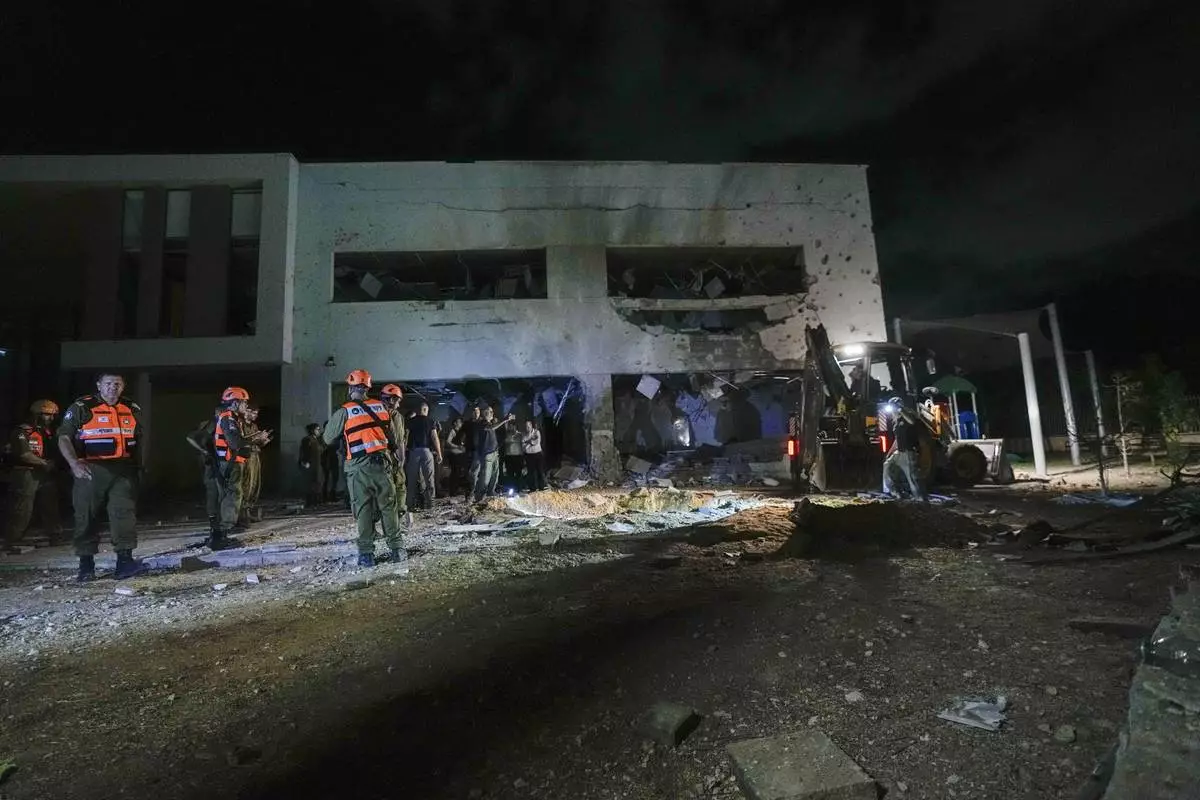
Israeli military and police work at a damaged school building that was hit by missiles fired from Iran in Gadera, Israel, Tuesday, Oct. 1, 2024. (AP Photo/Tsafrir Abayov)
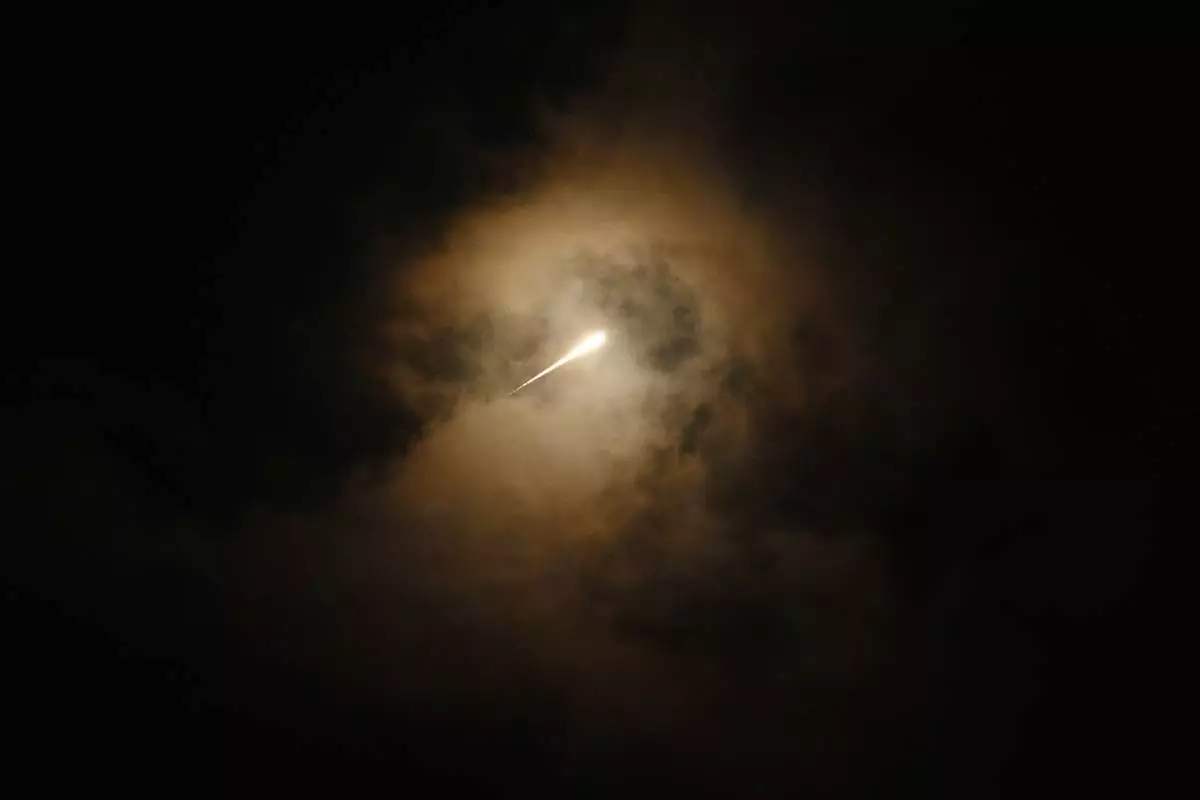
Projectiles fly through the sky in central Israel as a siren sounds a warning of incoming missiles fired from Iran towards Israel, Tuesday, Oct. 1, 2024. (AP Photo/Ohad Zwigenberg)
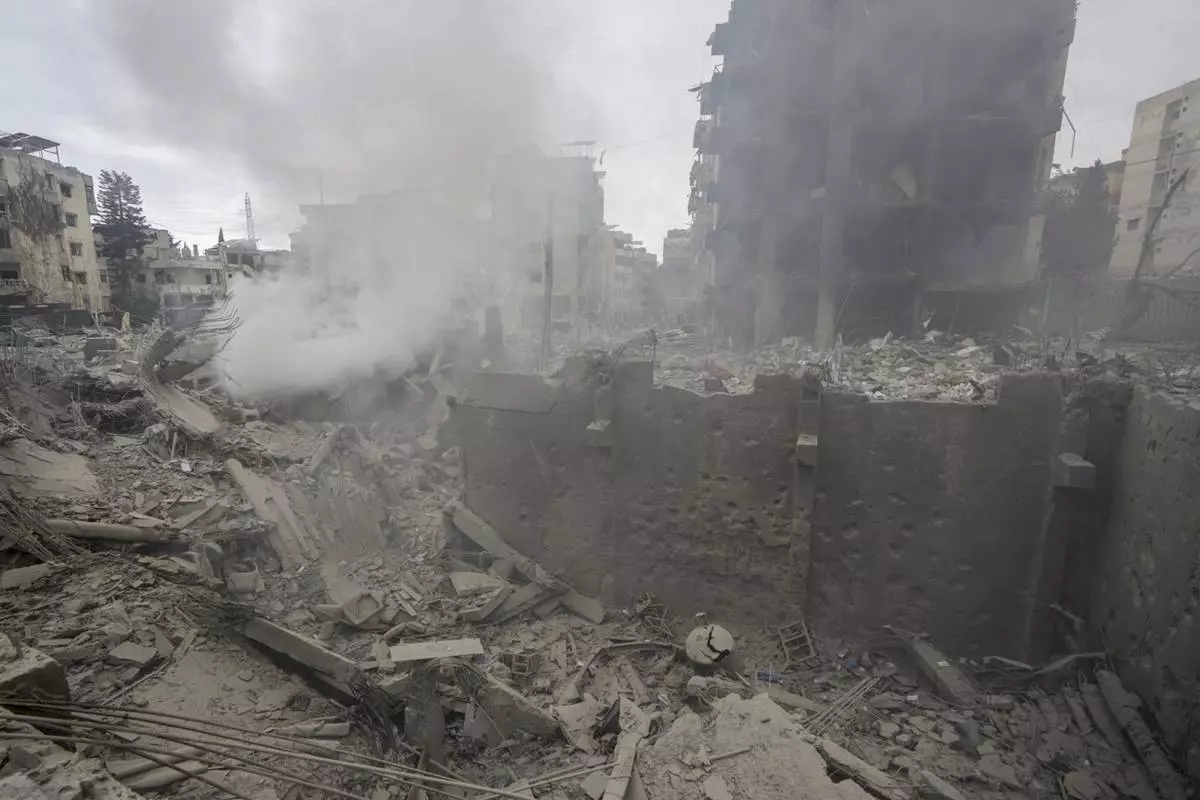
Smoke rises from destroyed buildings at the site of an Israeli airstrike hit in Choueifat, southeast of Beirut, Lebanon, Monday, Oct. 7, 2024. (AP Photo/Bilal Hussein)
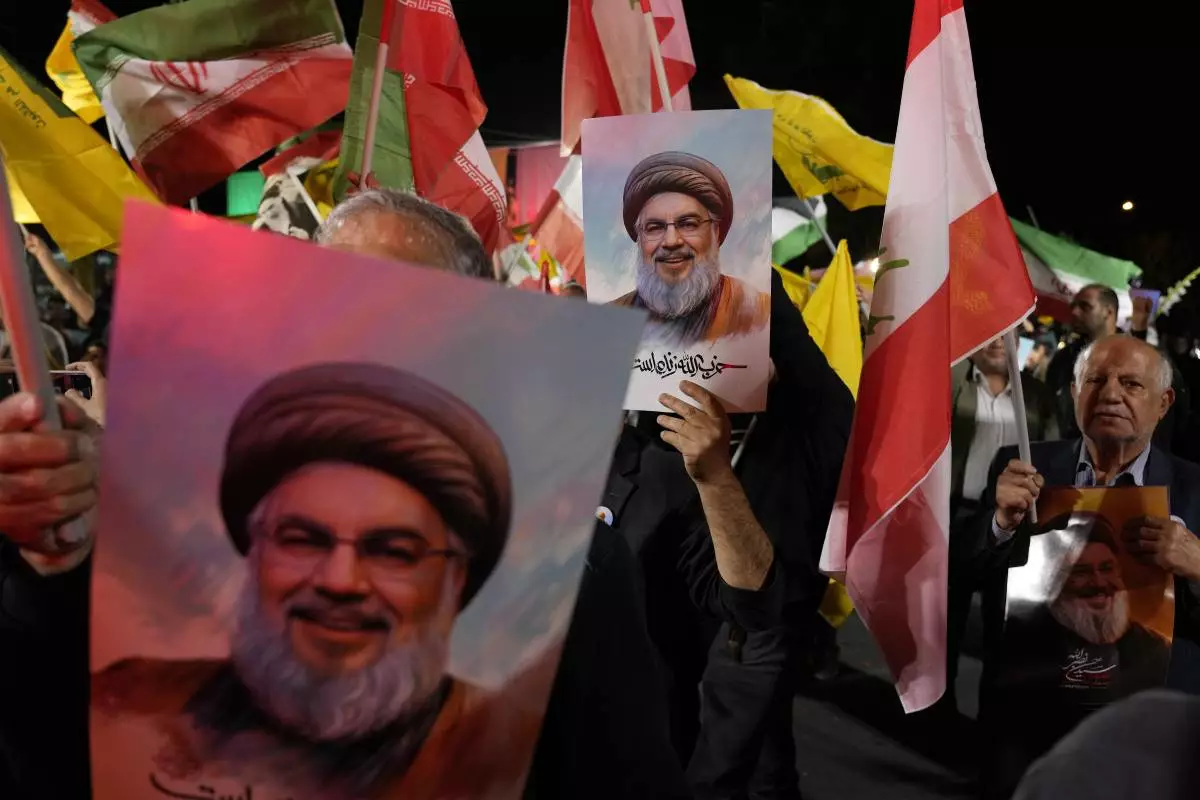
Iranian demonstrators hold posters of slain Hezbollah leader Hassan Nasrallah during an anti-Israeli protest at Felestin (Palestine) Square in Tehran, Iran, Tuesday, Oct. 1, 2024. (AP Photo/Vahid Salemi)
MAGDEBURG, Germany (AP) — Germans began Saturday mourning another violent attack and their shaken sense of security after a Saudi doctor drove a black BMW into a Christmas market teeming with holiday shoppers on Friday evening, killing at least two people, including a small child, and injuring at least 60 others in what authorities called a deliberate attack.
Authorities identified the suspect as a 50-year-old who has been living in Germany for nearly two decades and practicing medicine there. He was arrested Friday evening at the site of the attack as medical officials tended to the injured, and was taken into custody for questioning.
But on Saturday there were still no answers as to what caused the man to drive into a crowd in the eastern Germany city of Magdeburg.
The violence shocked the country and the city, bringing its mayor to the verge of tears and marring a festive event that’s part of a centuries-old German tradition. It prompted several other German towns to cancel their weekend Christmas markets as a precaution and out of solidarity with Magdeburg’s loss.
Chancellor Olaf Scholz and Interior Minister Nancy Faeser were due to travel to Magdeburg on Saturday, and a memorial service is to take place in the city cathedral in the evening.
“My thoughts are with the victims and their relatives," Scholz wrote on X. "We stand beside them and beside the people of Magdeburg.”
Magdeburg is a city of about 240,000 people, west of Berlin, that serves as Saxony-Anhalt’s capital. Friday’s attack came eight years after an Islamic extremist drove a truck into crowded Christmas market in Berlin, killing 13 people and injuring many others. The attacker was killed days later in a shootout in Italy.
Verified bystander footage distributed by the German news agency dpa showed the suspect’s arrest at a tram stop in the middle of the road. A nearby police officer pointing a handgun at the man shouted at him as he lay prone, his head arched up slightly. Other officers soon arrived and took the man into custody.
The two people confirmed dead were an adult and a toddler, but officials said additional deaths couldn't be ruled out because 15 people had been seriously injured.
“As things stand, he is a lone perpetrator, so that as far as we know there is no further danger to the city," Saxony-Anhalt's governor, Reiner Haseloff, told reporters. “Every human life that has fallen victim to this attack is a terrible tragedy and one human life too many.”
Authorities identified the suspect as a 50-year-old Saudi doctor who moved to Germany in 2006 and who had been practicing medicine in Bernburg, about 40 kilometers (25 miles) south of Magdeburg.
Saudi Arabia’s foreign ministry condemned the attack on X but did not mention the suspect’s connection to the kingdom.
Christmas markets are a German holiday tradition cherished since the Middle Ages, now successfully exported to much of the Western world.
Hours after Friday's tragedy, the wail of sirens clashed with the market’s festive ornaments, stars and leafy garlands.
Magdeburg resident Dorin Steffen told dpa that she was at a concert in a nearby church when she heard the sirens. The cacophony was so loud “you had to assume that something terrible had happened.”
She called the attack “a dark day” for the city.
“We are shaking,” Steffen said. “Full of sympathy for the relatives, also in the hope that nothing has happened to our relatives, friends and acquaintances.”
The attack reverberated far beyond Magdeburg, with Haseloff calling it a catastrophe for the city, state and country. He said flags would be lowered to half-staff in Saxony-Anhalt and that the federal government planned to do the same.
“It is really one of the worst things one can imagine, particularly in connection with what a Christmas market should bring," the governor said.
Moulson reported from Berlin.
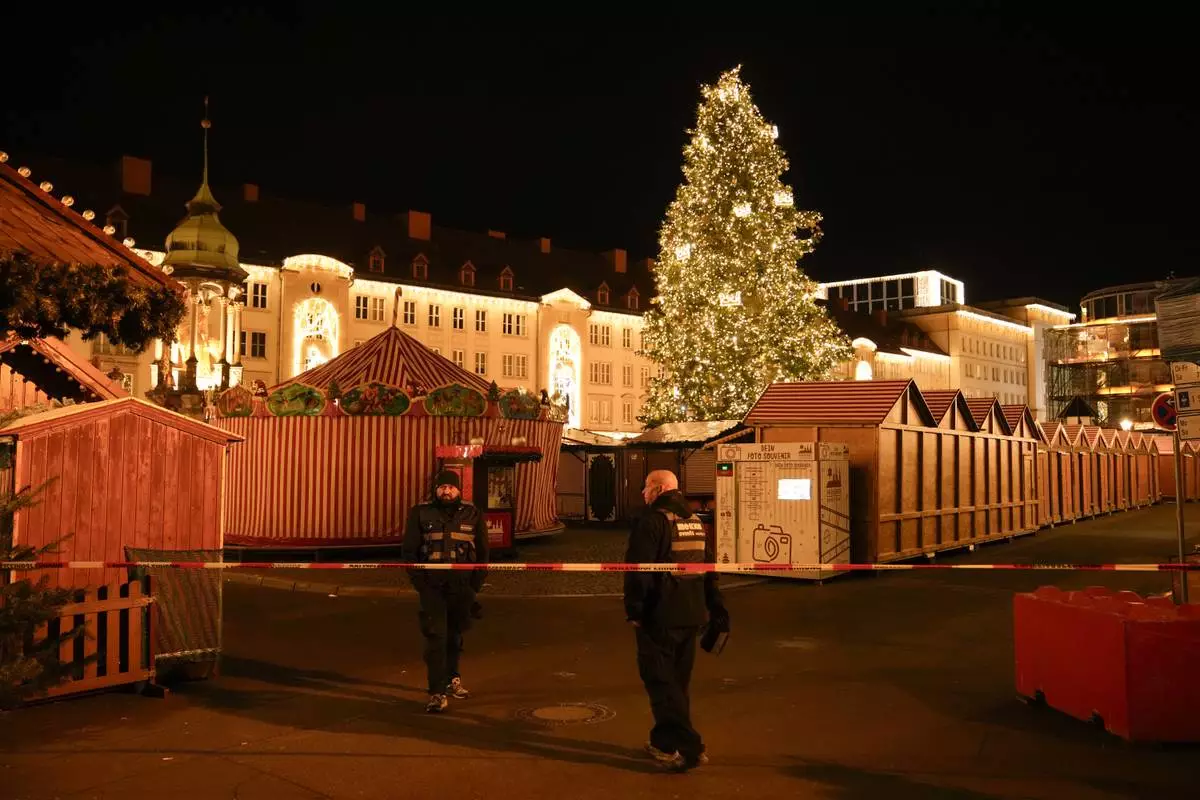
Security guards stand in front of a cordoned-off Christmas Market after a car crashed into a crowd of people, in Magdeburg, Germany, Saturday, Dec. 21, 2024. (AP Photo/Ebrahim Noroozi)
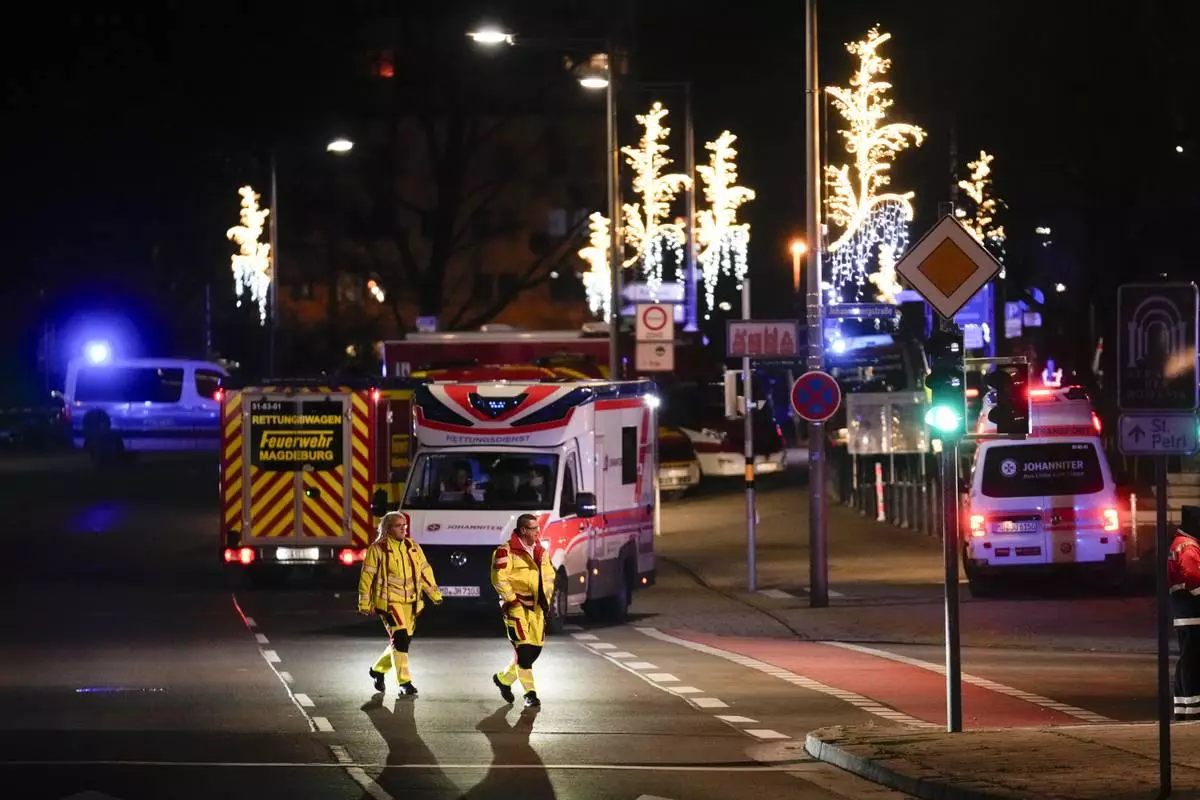
Emergency services work in a cordoned-off area near a Christmas Market, after a car drove into a crowd in Magdeburg, Germany, Saturday, Dec. 21, 2024. (AP Photo/Ebrahim Noroozi)
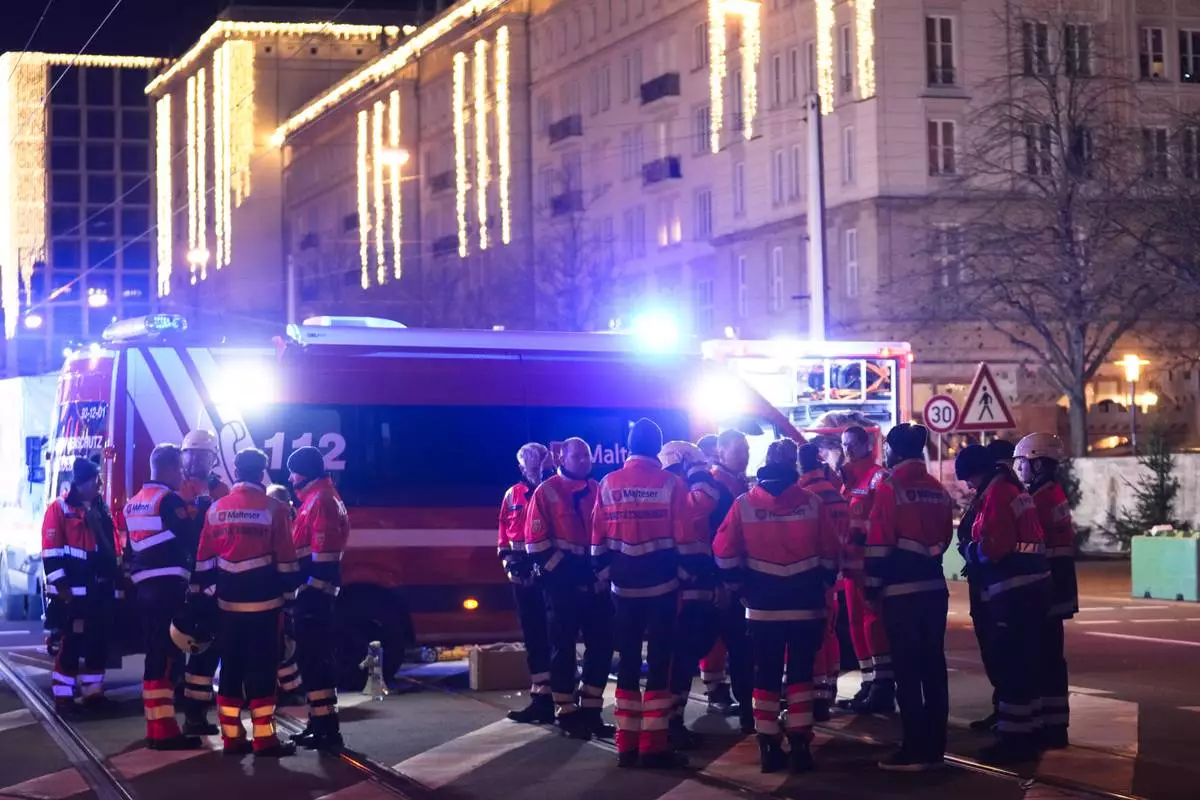
Emergency services work in a cordoned-off area near a Christmas Market, after a car drove into a crowd in Magdeburg, Germany, Friday, Dec. 20, 2024. (AP Photo/Ebrahim Noroozi)
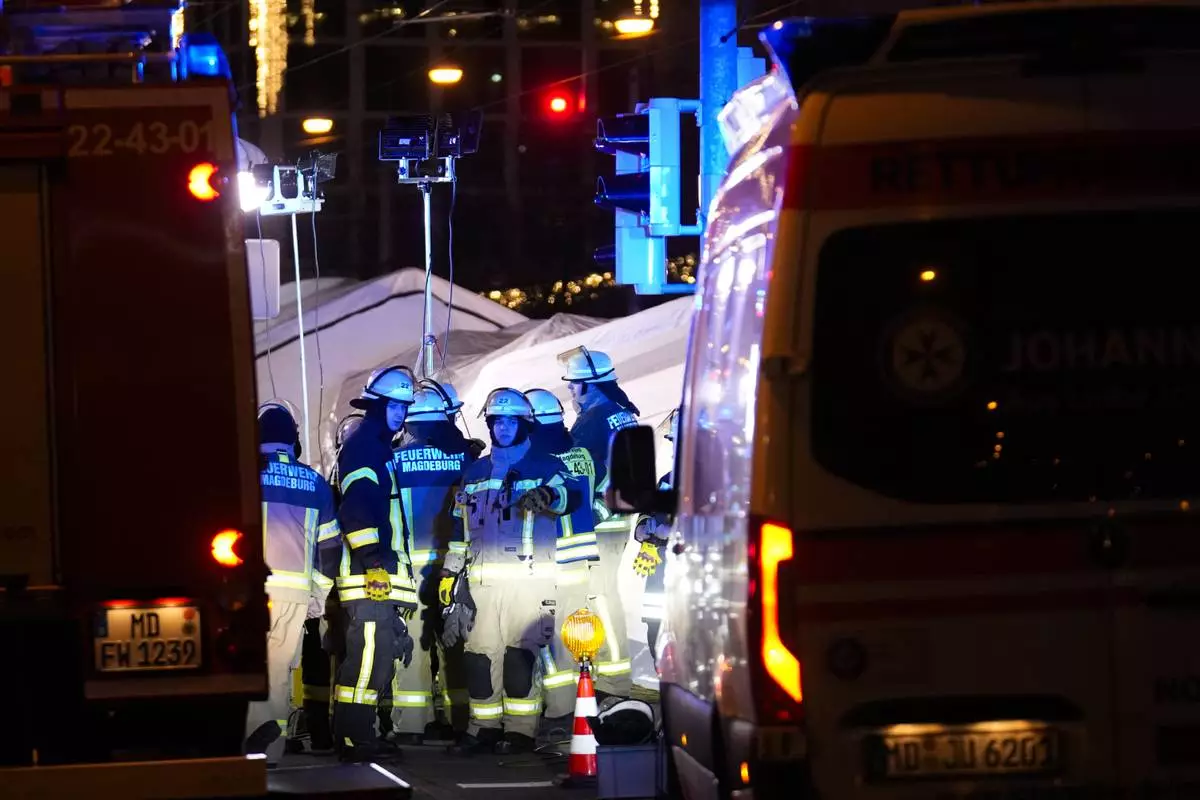
Emergency services work in a cordoned-off area near a Christmas Market, after a car drove into a crowd in Magdeburg, Germany, Friday, Dec. 20, 2024. (AP Photo/Ebrahim Noroozi)

Reiner Haseloff, Minister President of Saxony-Anhalt, center, is flanked by Tamara Zieschang, Minister of the Interior and Sport of Saxony-Anhalt, left, and Simone Borris, Mayor of the City of Magdeburg, at a press conference after a car plowed into a busy outdoor Christmas market in Magdeburg, Germany Friday, Dec. 20, 2024. (Hendrik Schmidt/dpa via AP)
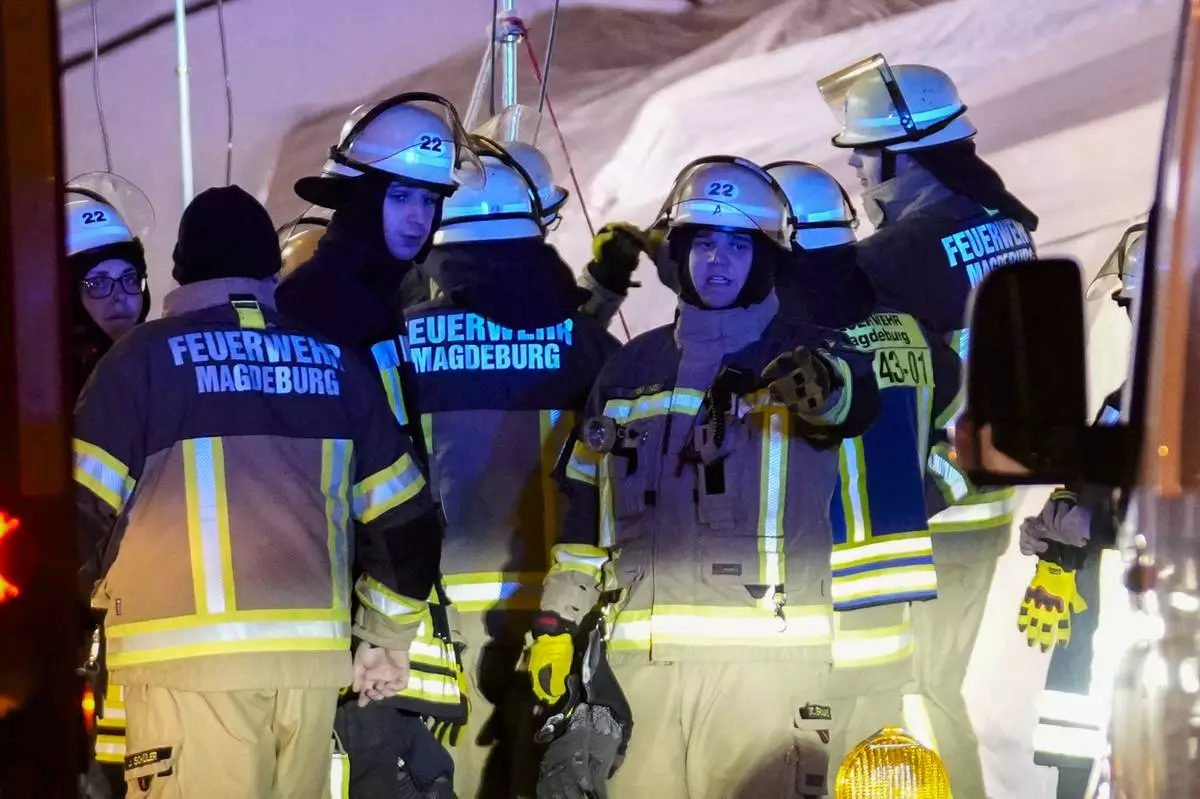
Emergency services work in a cordoned-off area near a Christmas Market, after a car drove into a crowd in Magdeburg, Germany, Friday, Dec. 20, 2024. (AP Photo/Ebrahim Noroozi)
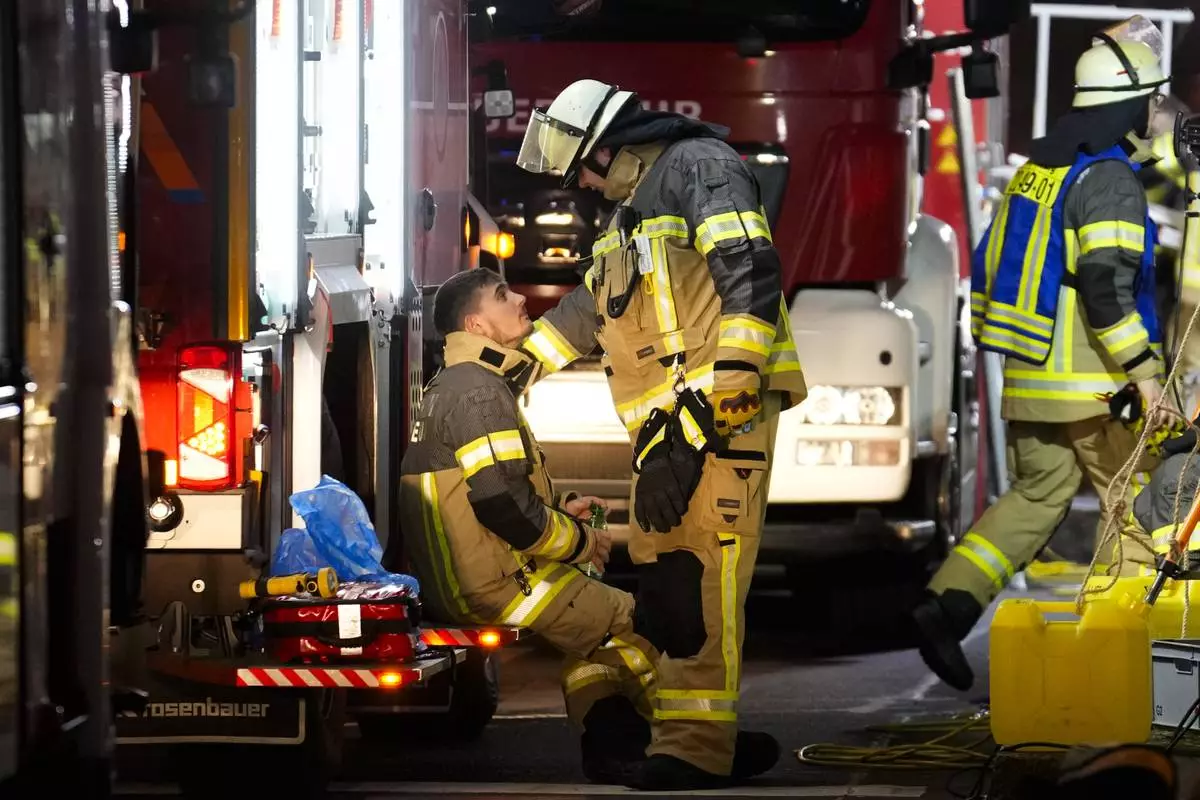
Emergency services work in a cordoned-off area near a Christmas Market, after a car drove into a crowd in Magdeburg, Germany, Friday, Dec. 20, 2024. (AP Photo/Ebrahim Noroozi)
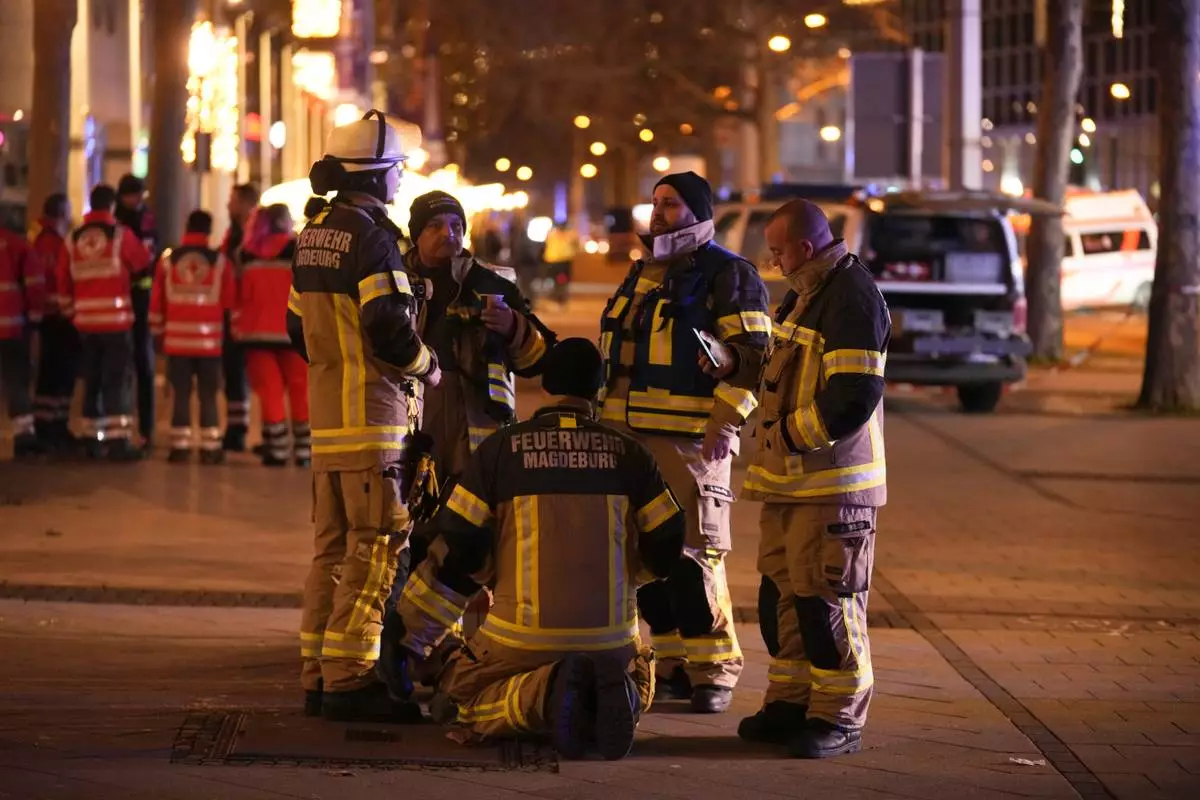
Emergency services work in a cordoned-off area near a Christmas Market, after a car drove into a crowd in Magdeburg, Germany, Friday, Dec. 20, 2024. (AP Photo/Ebrahim Noroozi)
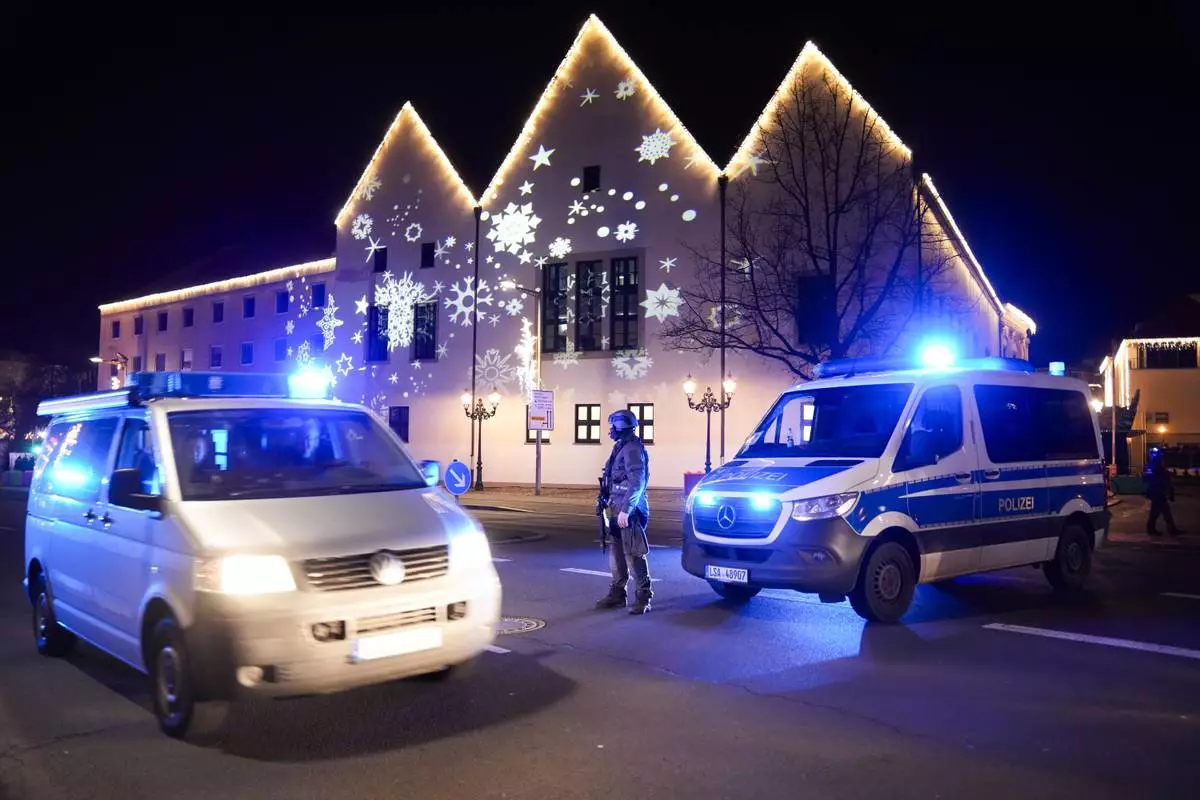
A police officer guards at a blocked road near a Christmas Market, after an incident in Magdeburg, Germany, Friday, Dec. 20, 2024. (AP Photo/Ebrahim Noroozi)
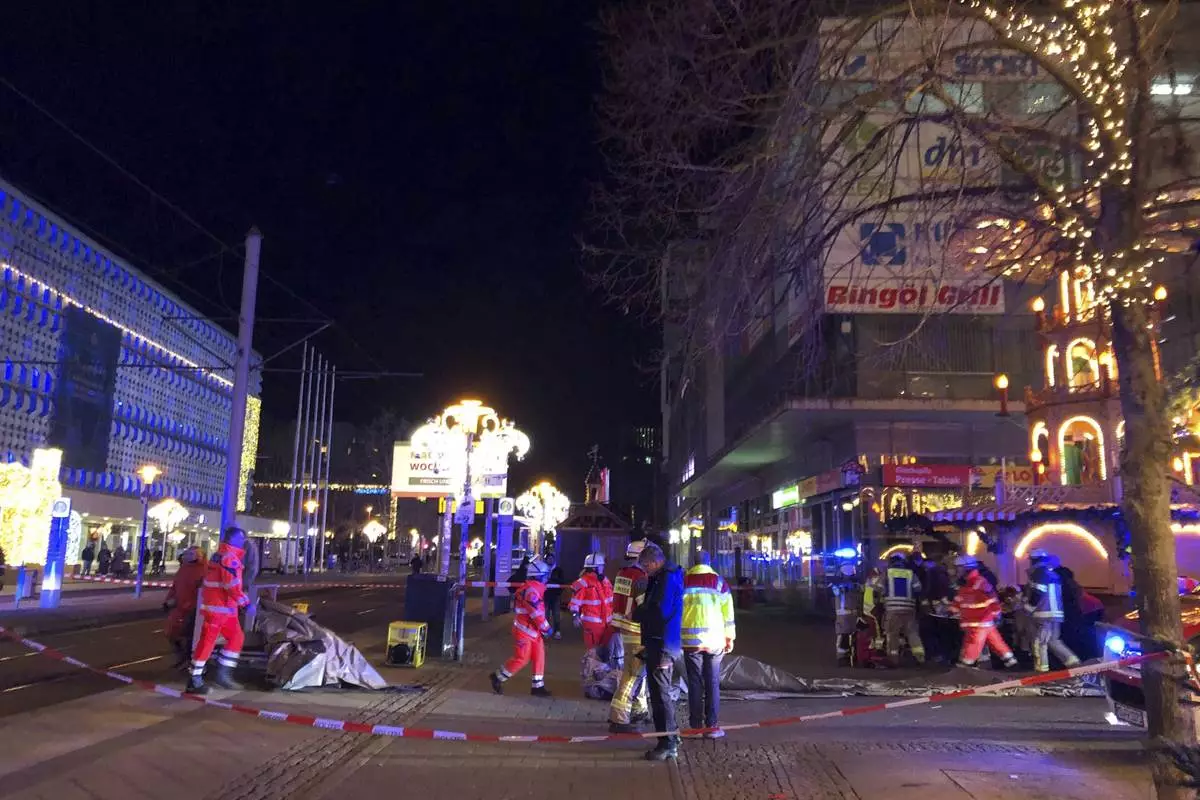
Emergency services attend an incident at the Christmas market in Magdeburg, Germany, Friday Dec. 20, 2024. (Dörthe Hein/dpa via AP)
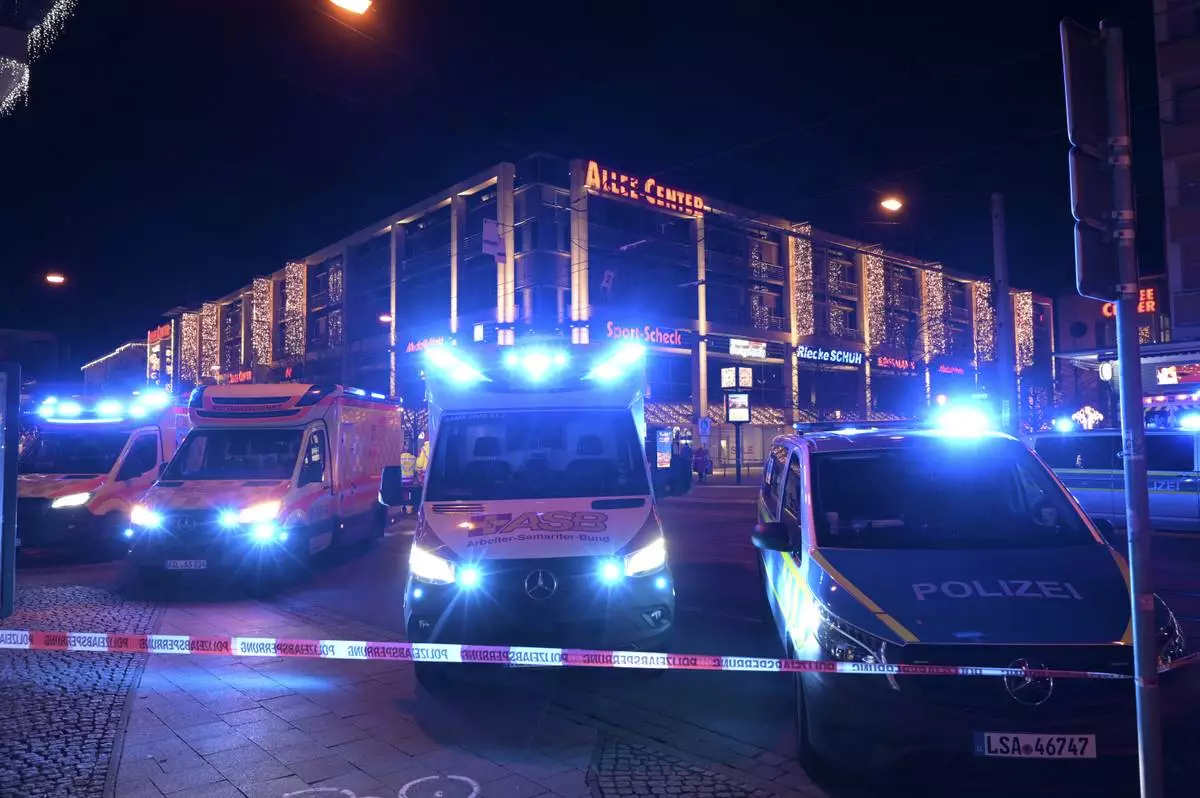
Emergency services attend an incident at the Christmas market in Magdeburg, Germany, Friday Dec. 20, 2024. (Heiko Rebsch/dpa via AP)
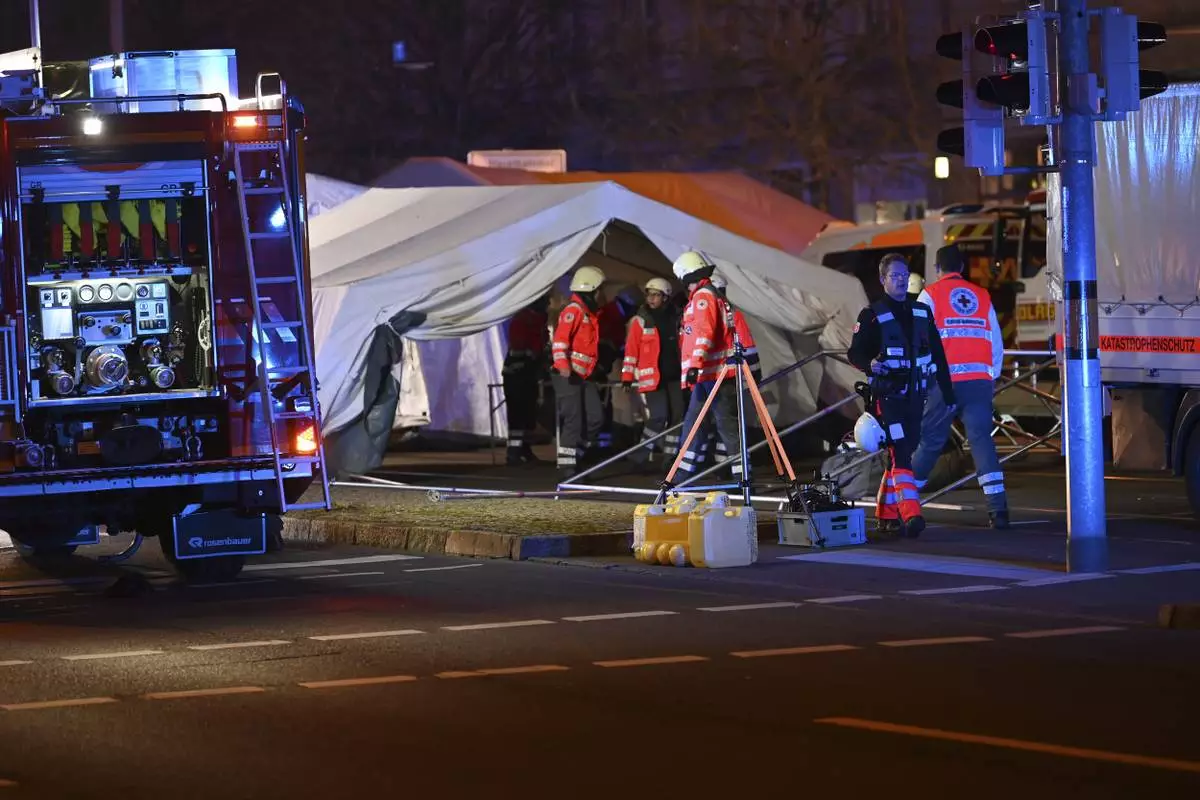
Emergency services attend an incident at the Christmas market in Magdeburg, Germany, Friday Dec. 20, 2024. (Heiko Rebsch/dpa via AP)
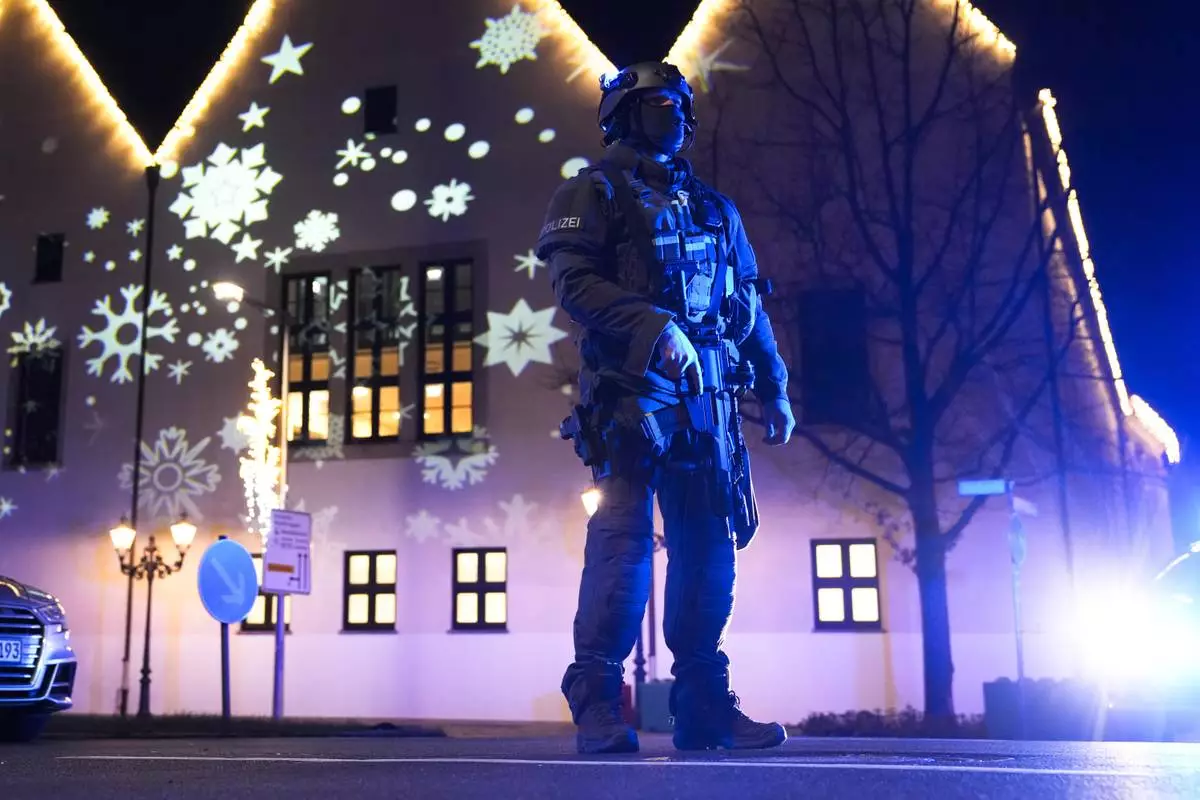
A police officer guards at a cordoned-off area near a Christmas Market after an incident in Magdeburg, Germany, Friday, Dec. 20, 2024. (AP Photo/Ebrahim Noroozi)
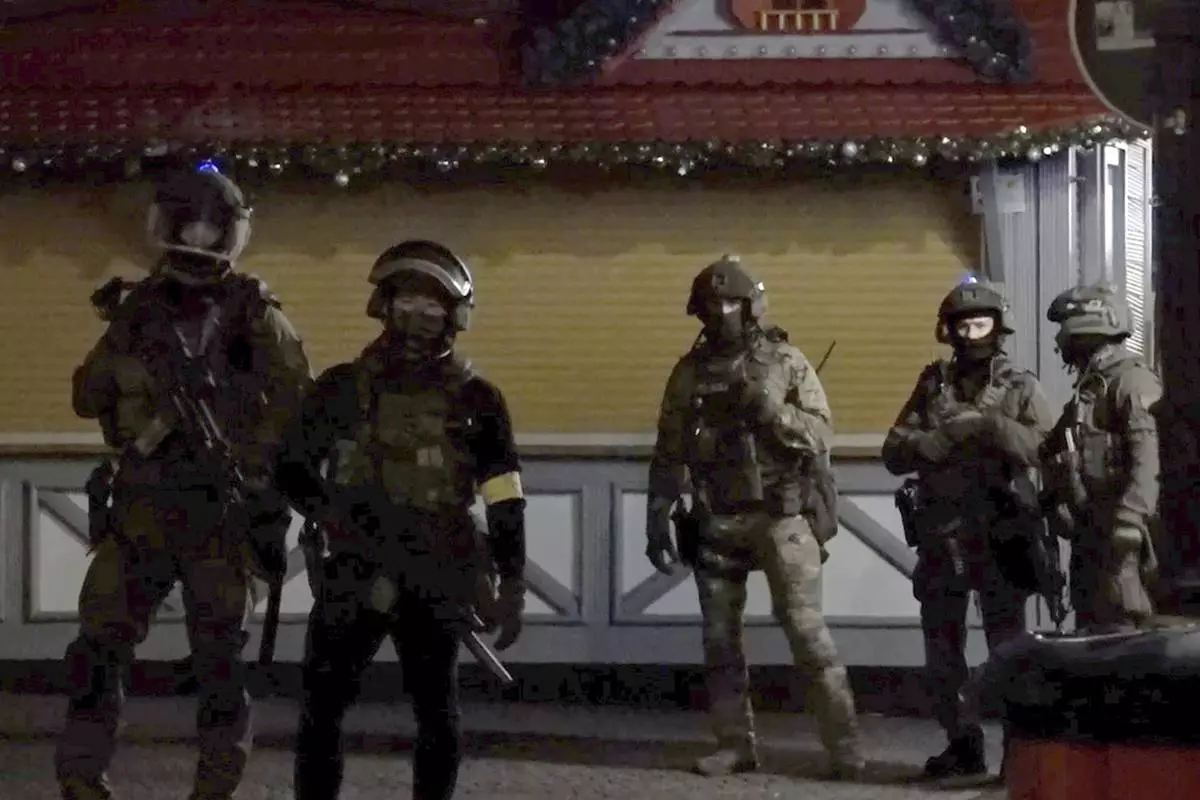
In this screen grab image from video, special police forces attend an incident at the Christmas market in Magdeburg, Germany, Friday Dec. 20, 2024. (Thomas Schulz/dpa via AP)
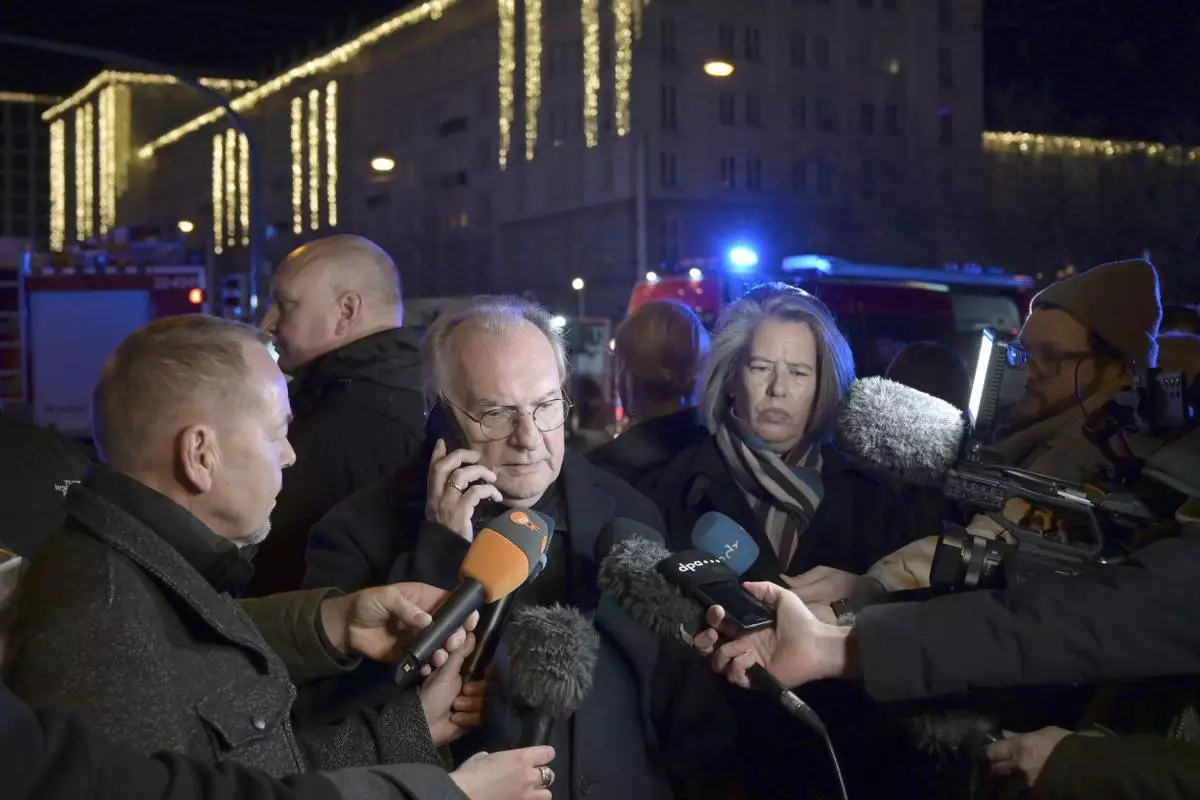
Reiner Haseloff (M, CDU), Minister President of Saxony-Anhalt, makes a statement after an incident at the Christmas market in Magdeburg, Germany, Friday Dec. 20, 2024. (Heiko Rebsch/dpa via AP)
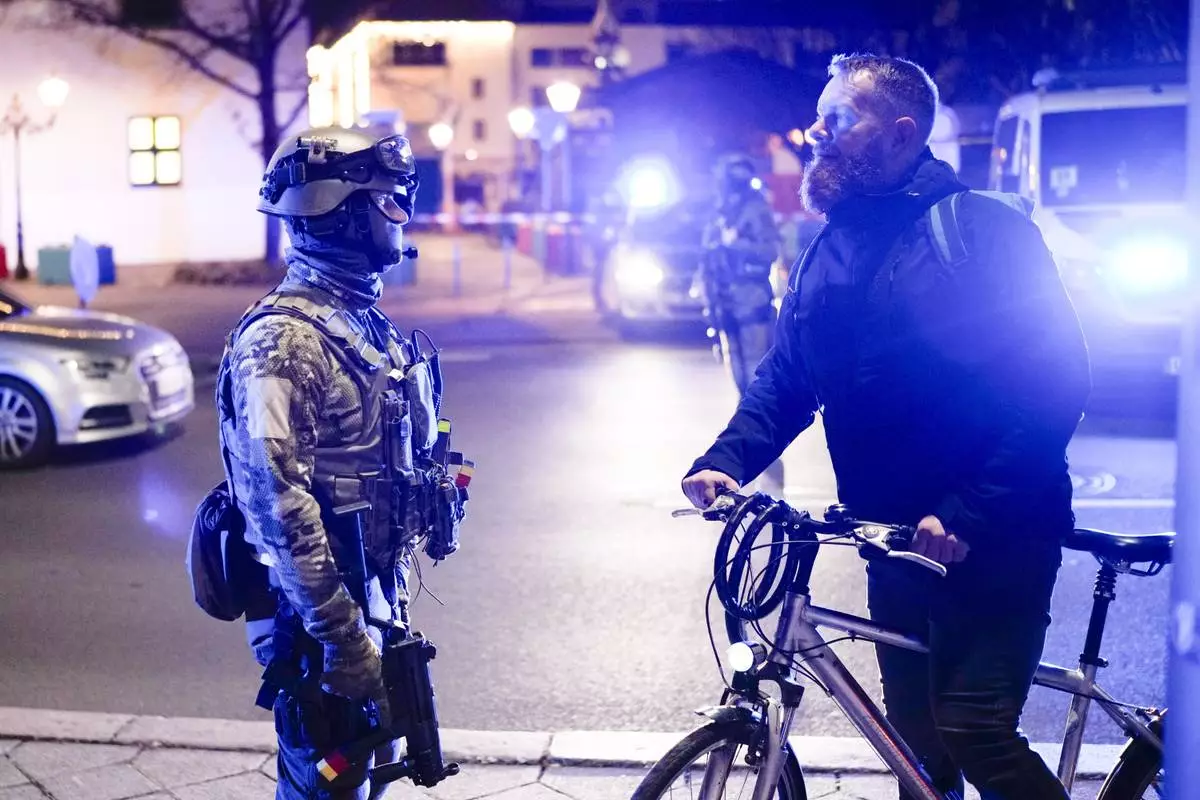
A police officer speaks with a man at a cordoned-off area near a Christmas Market after an incident in Magdeburg, Germany, Friday, Dec. 20, 2024. (AP Photo/Ebrahim Noroozi)
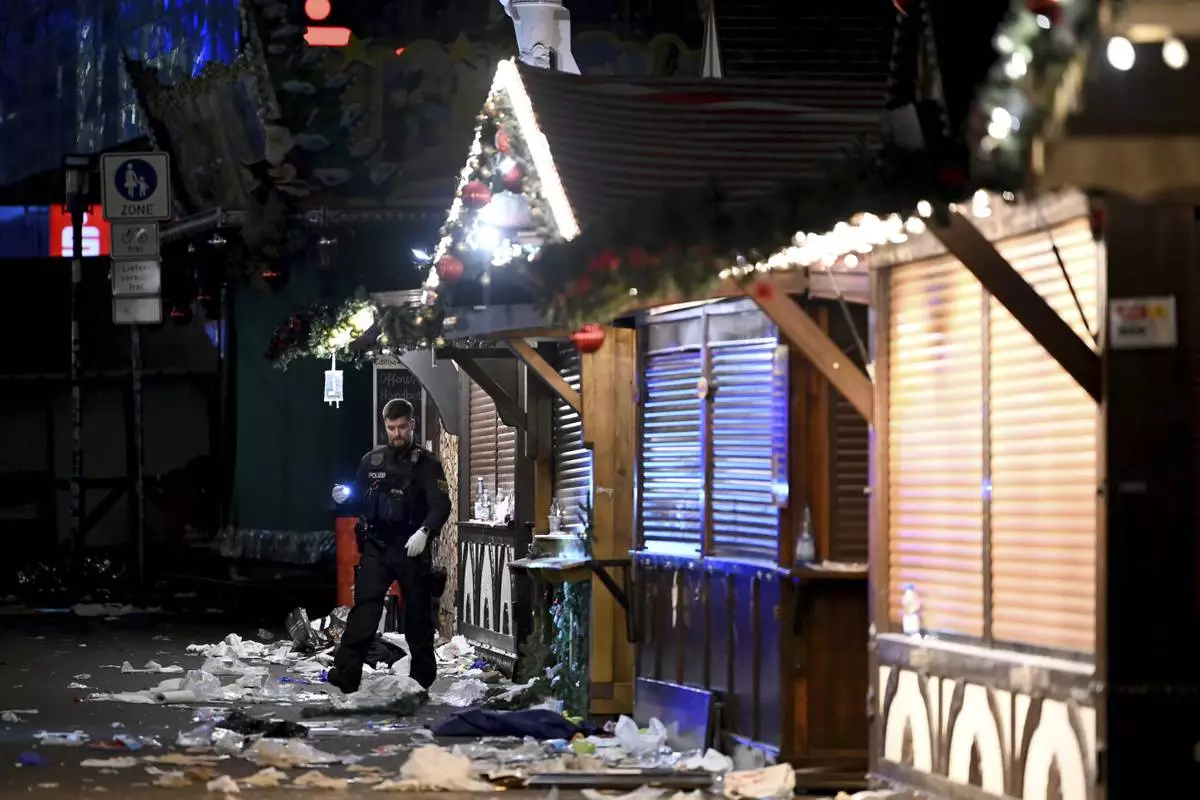
A policeman is seen at the Christmas market where an incident happened in Magdeburg, Germany, Friday Dec. 20, 2024. (Heiko Rebsch/dpa via AP)
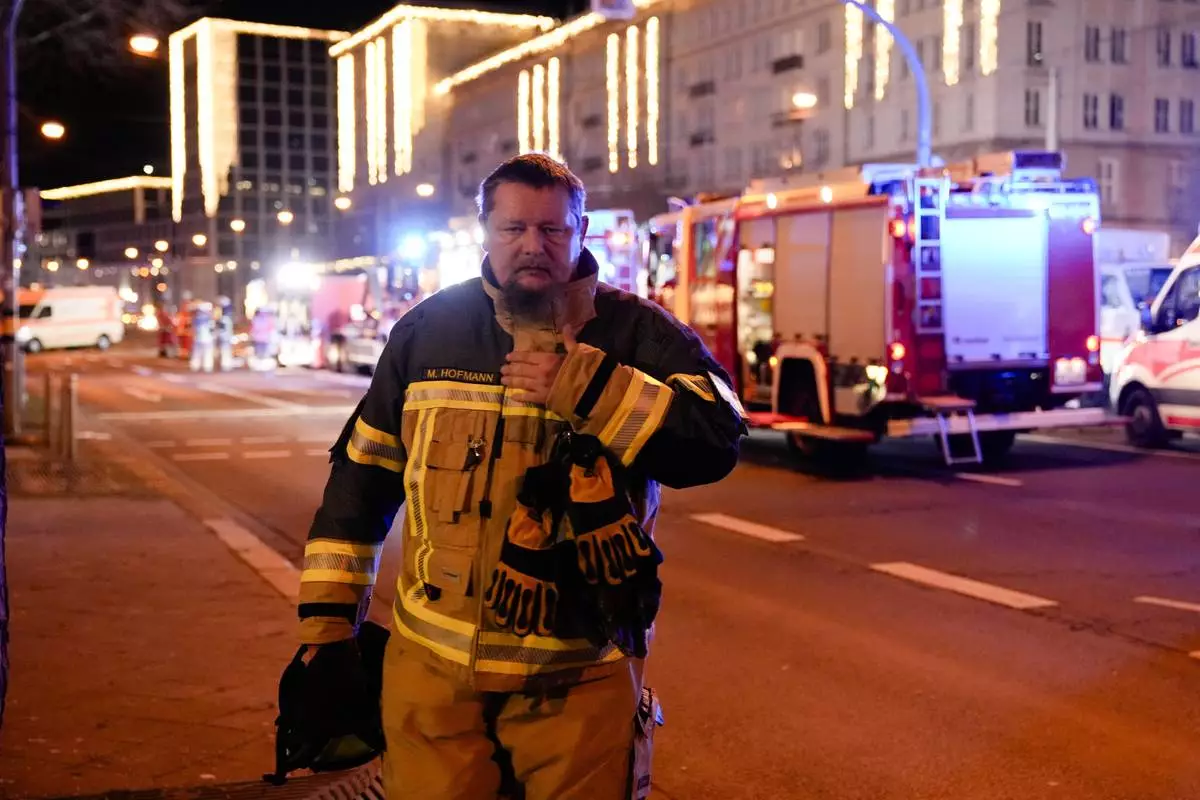
A firefighter walks through a cordoned-off area near a Christmas Market, after a car drove into a crowd in Magdeburg, Germany, Saturday, Dec. 21, 2024. (AP Photo/Ebrahim Noroozi)
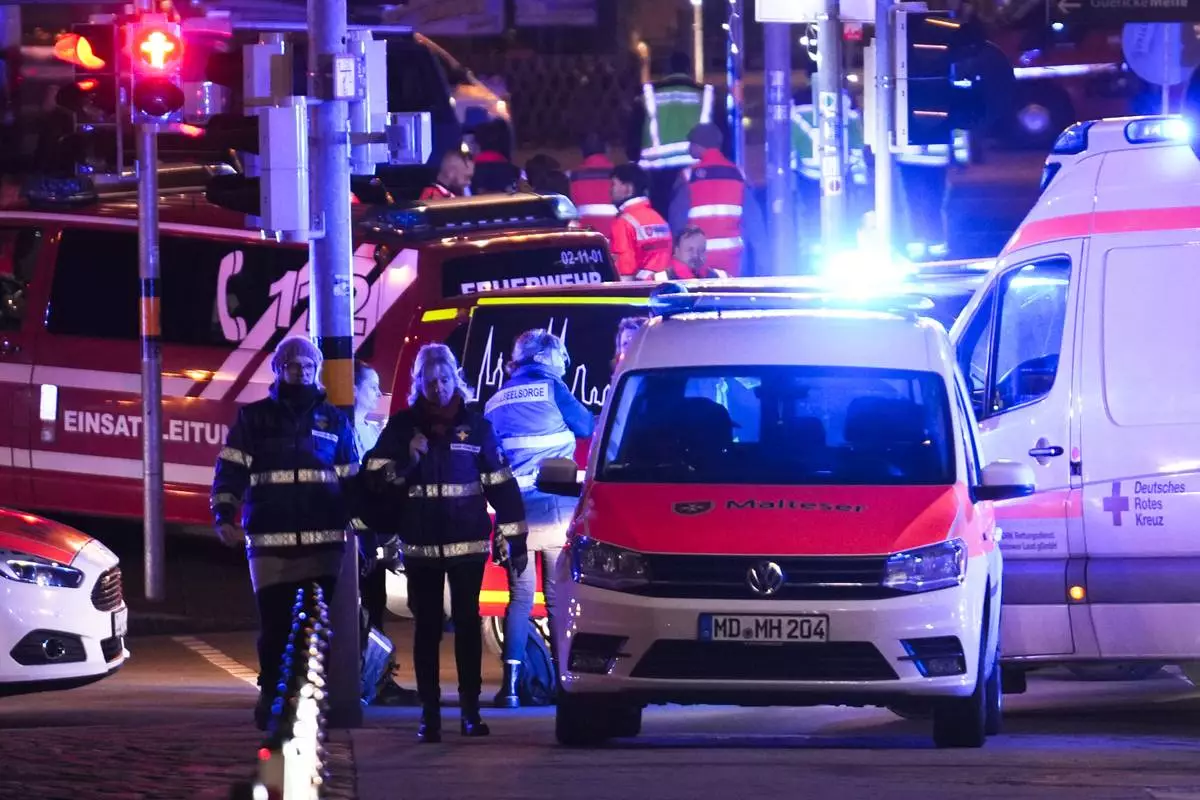
Emergency services work in a cordoned-off area near a Christmas Market, after an incident in Magdeburg, Germany, Friday, Dec. 20, 2024. (AP Photo/Ebrahim Noroozi)
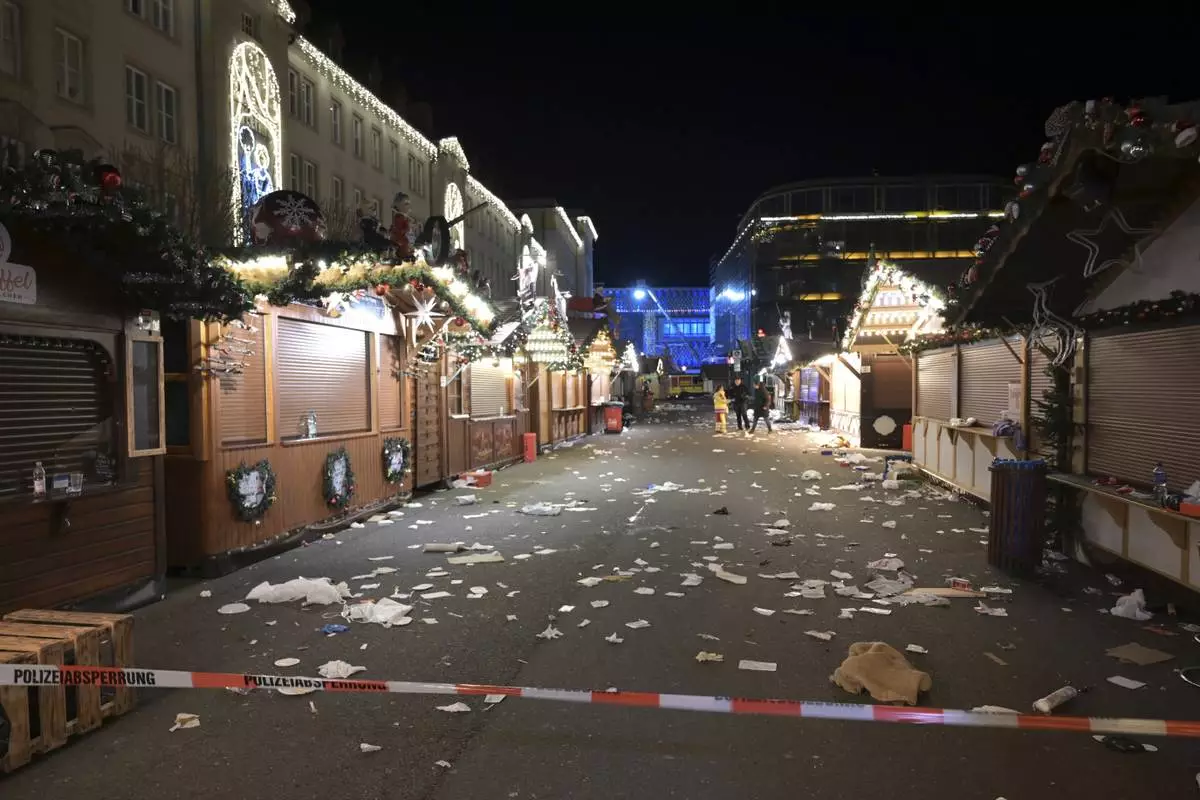
A view of the cordoned-off Christmas market after an incident in Magdeburg, Germany, Friday Dec. 20, 2024. (Heiko Rebsch/dpa via AP)
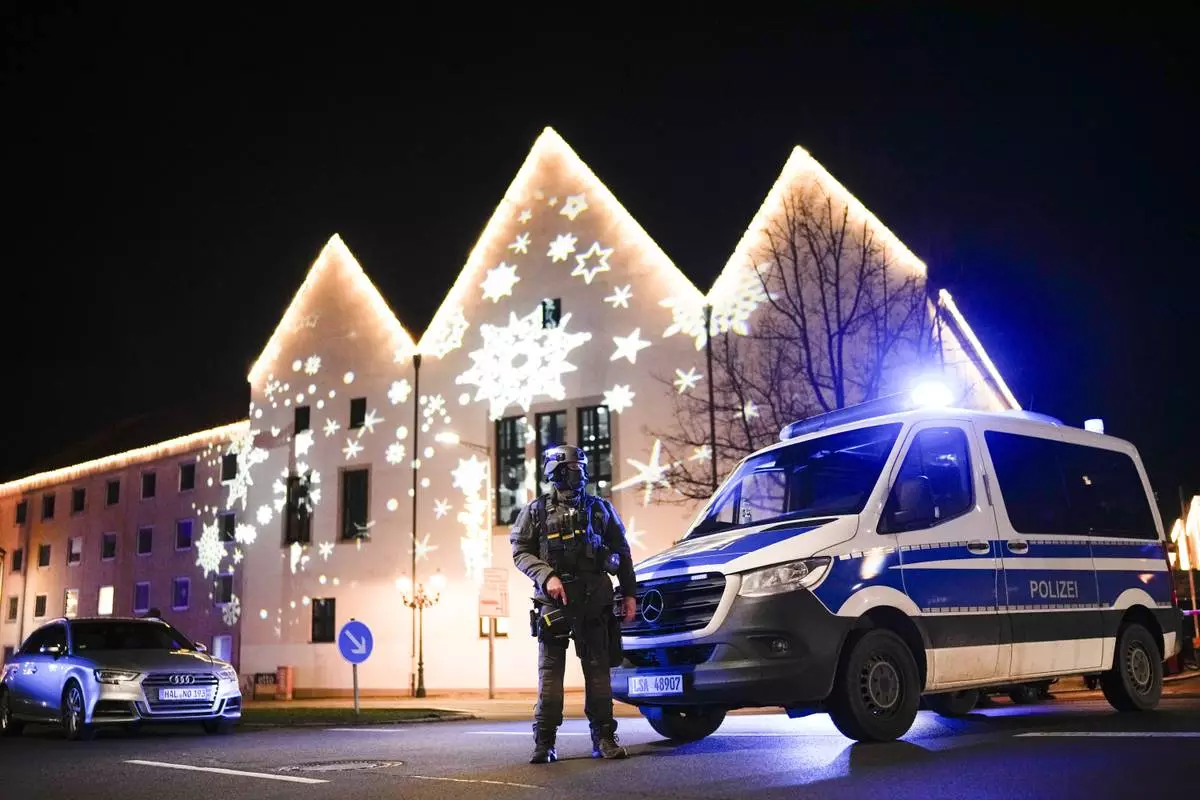
A police officer guards at a blocked road near a Christmas market after an incident in Magdeburg, Germany, Friday, Dec. 20, 2024. (AP Photo/Ebrahim Noroozi)
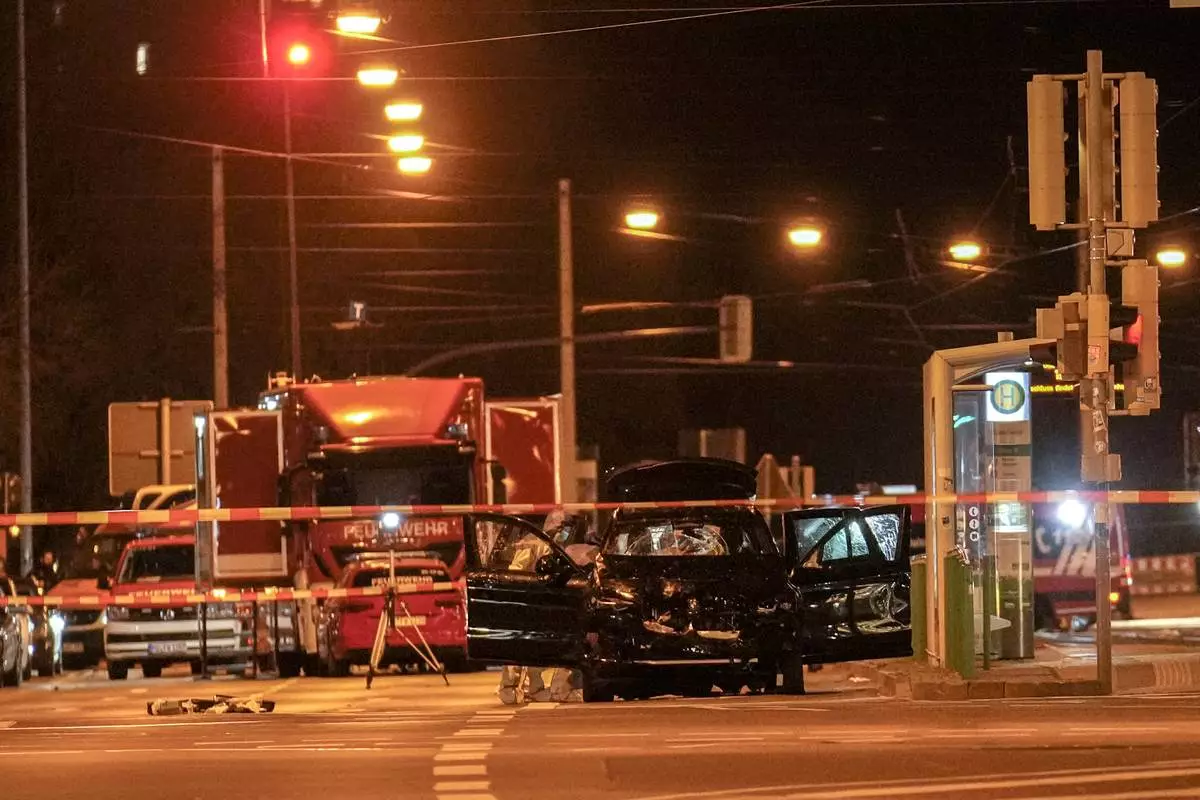
The car that was crashed into a crowd of people at the Magdeburg Christmas market is seen following the attack in Magdeburg, Germany, Saturday early morning, Dec. 21, 2024. (AP Photo/Ebrahim Noroozi)
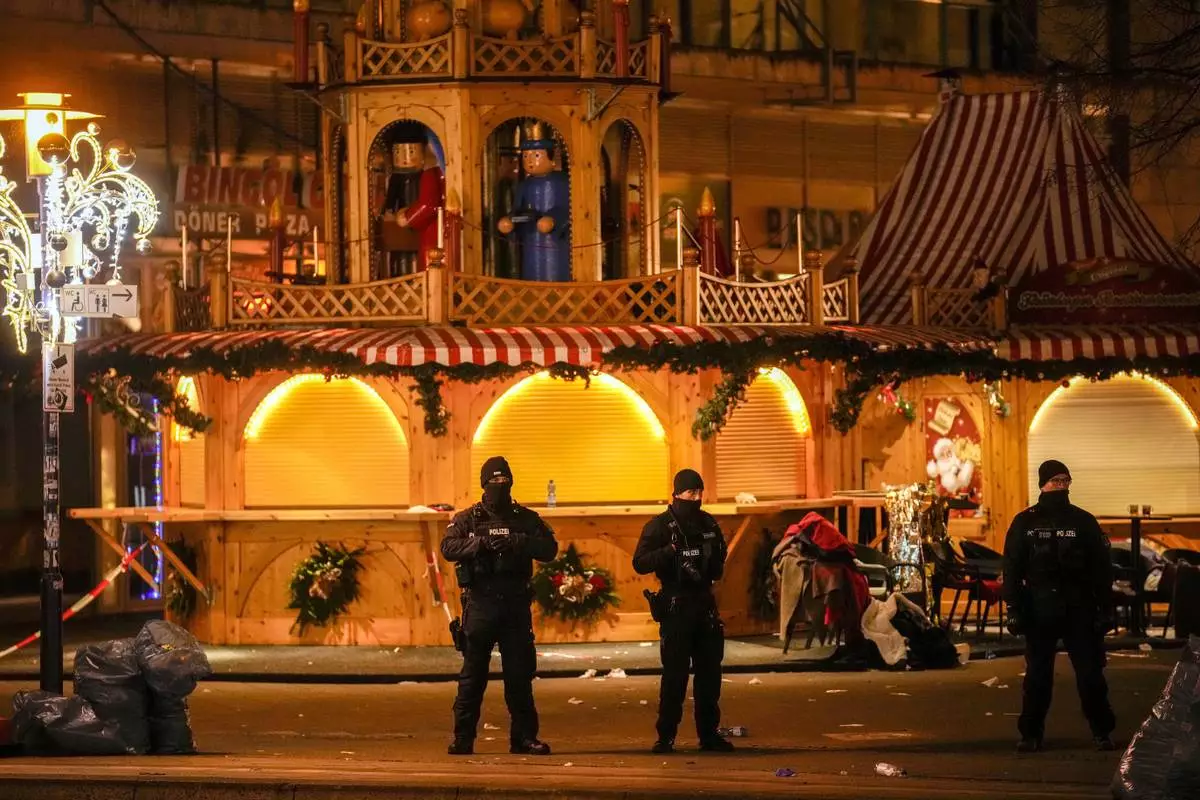
Security guards stand in front of a cordoned-off Christmas Market after a car crashed into a crowd of people, in Magdeburg, Germany, Saturday early morning, Dec. 21, 2024. (AP Photo/Ebrahim Noroozi)
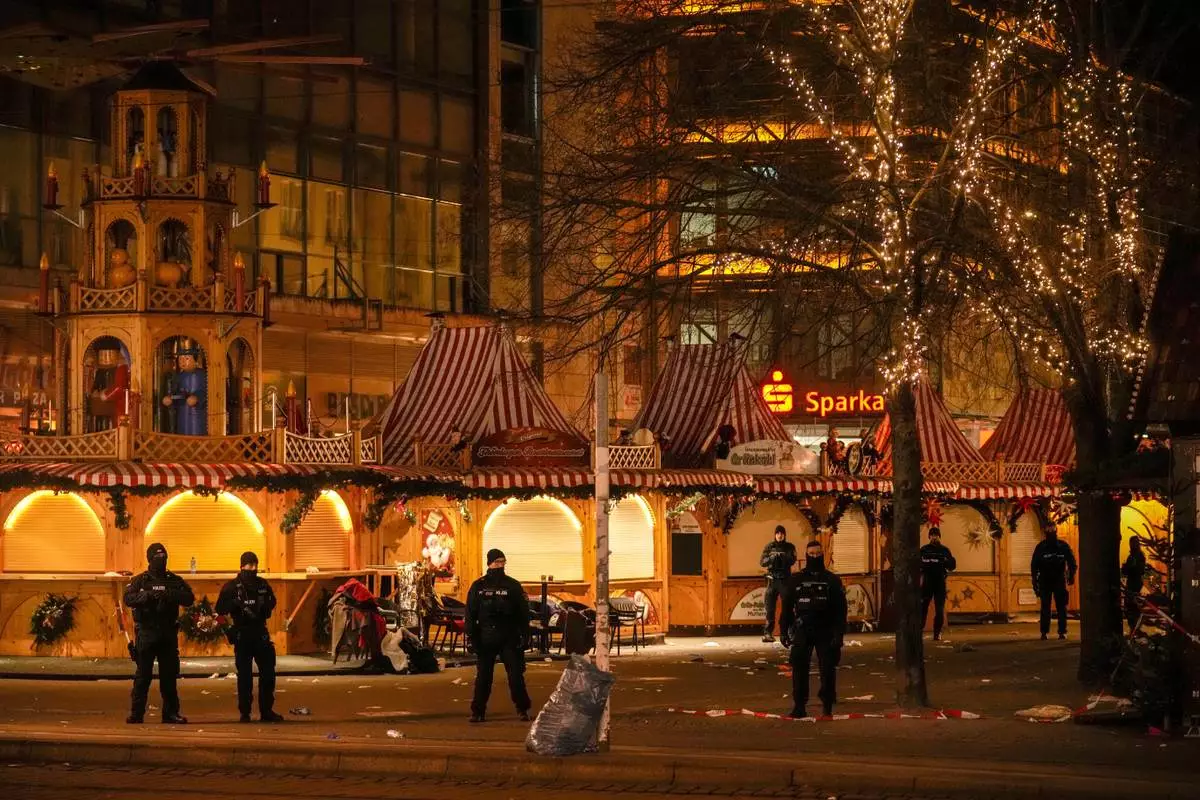
Security guards stand in front of a cordoned-off Christmas Market after a car crashed into a crowd of people, in Magdeburg, Germany, Saturday early morning, Dec. 21, 2024. (AP Photo/Ebrahim Noroozi)
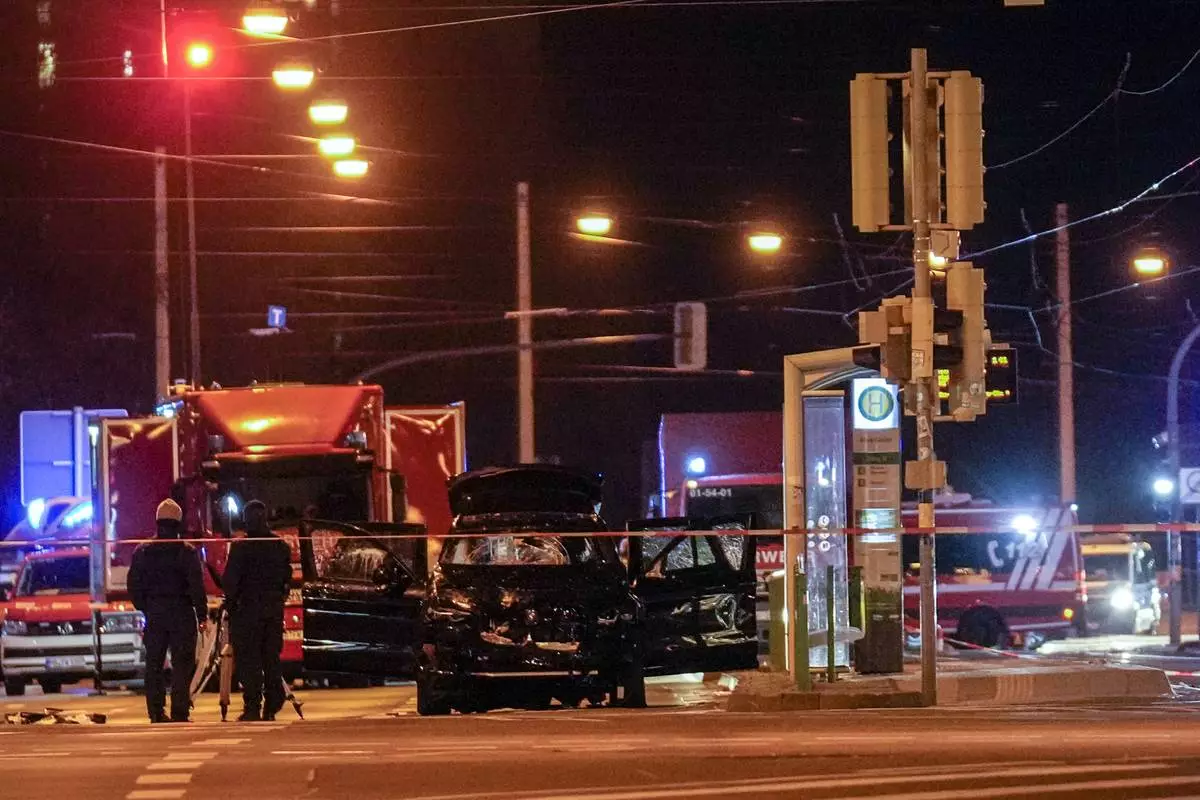
The car that was crashed into a crowd of people at the Magdeburg Christmas market is seen following the attack in Magdeburg, Germany, Saturday early morning, Dec. 21, 2024. (AP Photo/Ebrahim Noroozi)
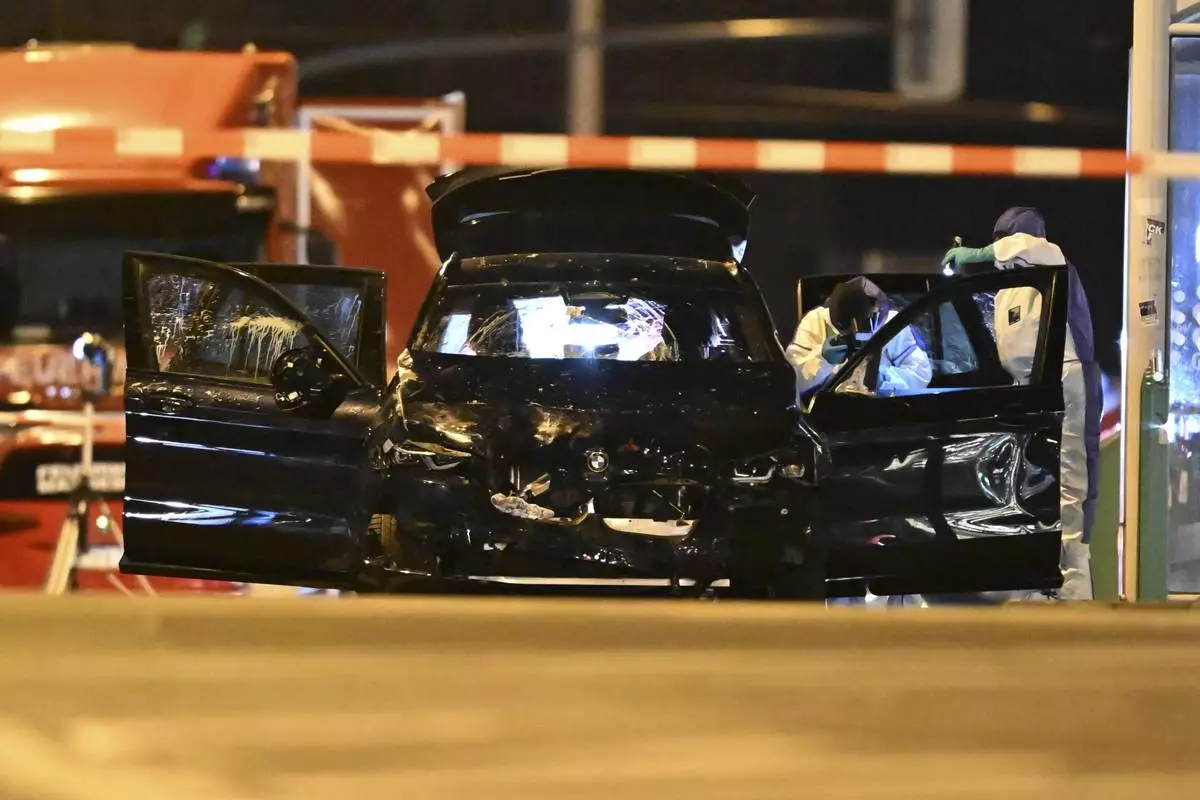
Forensics work on a damaged car sitting with its doors open after a driver plowed into a busy Christmas market in Magdeburg, Germany, early Saturday, Dec. 21, 2024. (Hendrik Schmidt/dpa via AP)






